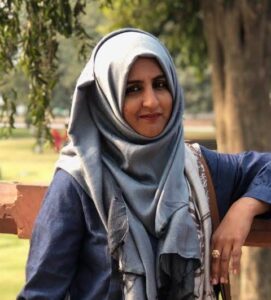
By Society Member Aliya Maqsood
Aliya Maqsood is a dedicated medical educator and a passionate researcher in molecular physiology. She excelled her teaching practices in Medical Education from Cardiff University. Her research centres around Vitamin D receptor gene polymorphisms and its signalling pathways. Aliya is committed to advancing medical education through evidence-based teaching and a passion for bridging research with real-world clinical learning.
As part of our Faces of Physiology Series, we spoke to Aliya Maqsood about what makes her unique, and why inclusion is a practical obligation and how inclusion improves the quality of science for all.
What has made you feel most supported as part of the Physiological Society?
What stood out to me most was the way I was welcomed as a whole person, not just as a scientist. I felt encouraged to bring my lived experiences into the conversation, and that kind of validation goes a long way. Access to opportunities was one part, but it was the human connections, the emails, the conversations after webinars, that reminded me I belonged. Even when I was working miles away from any major research hub, I didn’t feel invisible. The Society created space for members like me, those balancing family life with academic goals, to be part of the dialogue. It wasn’t just about access to resources or events, but about being seen, heard, and included. That emotional and intellectual safety net allowed me to stay committed to my work when it would’ve been easier to step back.
Why is it important to create an inclusive space within physiology?
A discipline that studies life should reflect its full spectrum. Inclusion is not just a moral obligation; it’s a practical one. When we only draw from similar backgrounds or experiences, our work lacks the depth and nuance that complexity requires. Physiology is deeply influenced by context, as culture, environment, and community shape our understanding of the body. By making space for people from diverse backgrounds, we enhance our collective insight. Inclusion ensures that people who ask different questions, due to their identity and experiences, aren’t left out of the conversation. It also fosters a culture where no one feels forced to choose between authenticity and acceptance. An inclusive space doesn’t just benefit the underrepresented; it improves the overall quality of science for everyone.
What makes you unique?
I carry a dual awareness into every room I enter, of both what is present and what is missing. That awareness has been shaped by working without safety nets, balancing professional goals with personal responsibilities, and carving out time for science in the quiet moments between life’s demands. I’ve learned to be resourceful without letting scarcity define the tone of my work. My approach isn’t about grand gestures; it’s about consistency, presence, and the belief that care and competence can coexist. I’m just as committed to nurturing people as I am to testing hypotheses. My path hasn’t been a straight line, and that’s become my strength; it’s given me perspective, empathy, and a creative edge that I carry into research, teaching, and leadership.
What is your hidden superpower?
Adaptability is my quiet strength. As an Asian woman in science, I’ve often had to navigate more than just experiments; I’ve moved through cultural expectations, limited infrastructure, and societal roles that weren’t designed with people like me in mind. My ability to adjust isn’t just about flexibility; it’s about survival, strategy, and subtle rebellion. Whether I’m reworking protocols with basic tools or shifting between research deadlines and caregiving duties, I find ways to keep moving without losing purpose. I don’t wait for perfect conditions; I work with what’s available and still aim for impact. This mindset has helped me thrive in spaces where the odds were rarely in my favour. I’ve learned to face challenges with creativity, to adapt with grace, and to lead without needing a spotlight. That’s my superpower: quiet, steady, and deeply rooted in lived experience.
These are the faces of physiology. Help us see the full picture — complete our EDI survey this autumn to help shape the future of an inclusive community.
We’re always looking to celebrate our members and their stories. If you would like to share your story with us, please contact membership@physoc.org.

